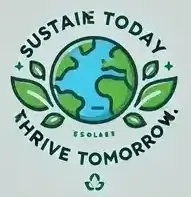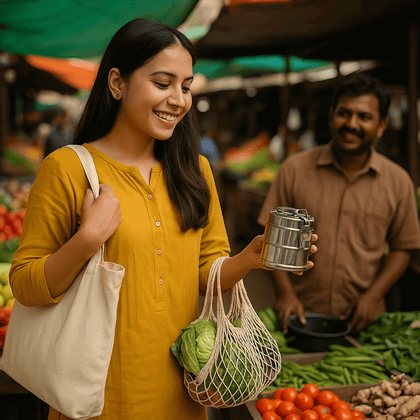Introduction: Understanding the Zero Waste Lifestyle in India
The Zero Waste Lifestyle in India is gaining momentum as people become more environmentally conscious. In India, where “jugaad” (creative problem-solving) is deeply embedded in everyday life, the zero-waste lifestyle is more than a trend—it’s a return to time-tested traditions and a smart, modern response to our growing waste crisis.
As India grapples with overflowing landfills, polluted waterways, and the environmental pressures of rapid urbanization, a growing community of environmentally conscious citizens is proving that living with minimal waste is not only possible, but practical, economical, and sustainable. By reducing household waste, zero-waste practices directly help lower plastic pollution, landfill emissions, and contamination of soil and water systems in Indian cities.
Whether you’re concerned about environmental impact, looking to simplify your life, or simply hoping to save money, adopting zero-waste practices can transform your relationship with consumption and waste.
This comprehensive guide explores how Indians navigate the zero-waste journey, blending ancient wisdom with contemporary solutions to create more sustainable households and communities.
“Across Indian cities and towns, more people are rethinking daily habits—from how they shop to how they manage waste at home.”
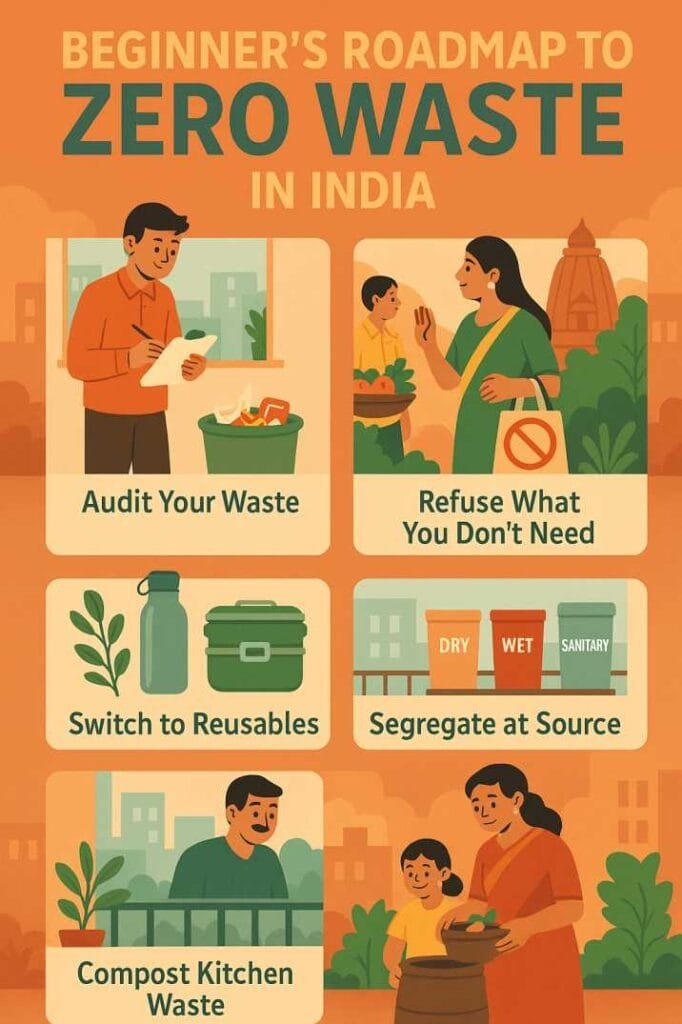
Table of Contents
Understanding Zero Waste in the Indian Context
What Does “Zero Waste” Actually Mean?
The zero-waste philosophy aims to significantly reduce the amount of trash sent to landfills by redesigning our relationship with resources. Rather than the traditional linear economy model of “take-make-dispose,” zero waste embraces a circular approach where materials remain in use through reuse, repair, recycling, and composting.
In practice, perfect “zero” waste may be difficult to achieve, but the goal is to minimize waste as much as possible while being mindful of resource consumption. For many Indians, this approach resonates with traditional practices that emphasize frugality, resourcefulness, and respect for natural resources.
The Unique Challenges and Opportunities in India
India’s waste management challenges are distinct from those in Western countries, presenting both unique obstacles and advantages for those pursuing a zero-waste lifestyle:
Challenges:
- Inadequate waste segregation infrastructure in many areas
- Prevalence of single-use plastics and packaging
- Limited awareness about proper waste disposal methods
- Varying levels of municipal waste collection services
Opportunities:
- Strong tradition of reuse and repair
- Vibrant local markets that often use less packaging
- A growing ecosystem of eco-entrepreneurs offering zero-waste solutions
- Rich heritage of sustainable practices (steel tiffins, cloth bags, etc.)
As Mridula Murali, founder of Ullisu, a zero-waste store in Bangalore, explains: “India has a long history of sustainable living before the convenience culture took over. Our grandparents lived largely zero-waste lives without even calling it that. We’re just rediscovering old wisdom with a modern twist.”
According to research by the Centre for Science and Environment (CSE India), inadequate waste segregation and plastic proliferation are major urban challenges.
Traditional vs. Modern Zero-Waste Practices in India
| Category | Traditional Practice Modern | Zero-Waste Alternative | Key Benefit |
| Shopping Bags | Cloth/jute bags (e.g., “thaila” for groceries) | Reusable cotton/mesh produce bags | Eliminates single-use plastic bags. |
| Food Storage | Stainless steel dabbas, banana leaves | Feeding food scraps to cattle and composting | No plastic waste, preserves food freshness. |
| Cleaning | Cow dung/ash for disinfecting, shikakai for hair | Vinegar + baking soda, DIY citrus cleaners | Chemical-free, biodegradable solutions. |
| Personal Care | Neem twigs as toothbrushes, besan for skincare | Bamboo toothbrushes, package-free shampoo bars | Reduces plastic waste, toxin-free. |
| Waste Disposal | Feeding food scraps to cattle, composting | Bokashi bins, community composting hubs | Diverts organic waste from landfills. |
| Festivals | Clay diyas, flower decorations | Seed paper invites, plantable Ganesh idols | Zero-waste celebrations, eco-friendly gifting. |
| Clothing | Hand-me-downs, stitching repairs | Clothing swaps, rental fashion platforms | Extends garment life, reduces fast fashion waste. |
Getting Started: First Steps Toward a Zero-Waste Home
Conducting a Waste Audit
The journey to zero waste begins with understanding what you’re throwing away. A simple waste audit can reveal surprising patterns:
- Collect all waste generated by your household for one week
- Categorize it (plastic, paper, food waste, etc.)
- Identify your top waste sources
- Brainstorm alternatives for these high-waste items
Most Indian households discover that kitchen waste, packaging, and single-use plastics make up the majority of their trash, areas where impactful changes can be made relatively easily.
Beginner Roadmap: How to Start a Zero-Waste Lifestyle in India (2025)
Starting a zero-waste lifestyle is much easier when you begin with small, manageable steps. Most Indian households can reduce a large portion of their waste within weeks by making simple, affordable changes.
1. Make Your First 5 Easy Zero-Waste Swaps
These swaps provide instant results without requiring expensive products:
- Cloth bags instead of plastic carry bags
- Steel or glass containers instead of plastic boxes
- Reusable tiffin or dabba for takeaways
- Bar soaps instead of bottled liquid soaps
- A refillable or reusable water bottle
These five habits alone significantly cut down disposable waste entering your home.
2. Follow a 30-Day Starter Plan
Week 1 — Foundation
• Track your waste
• Replace 2–3 single-use items
• Carry your bag and bottle everywhere
Week 2 — Kitchen Focus
• Begin composting
• Buy essentials in bulk
• Shift to reusable storage
Week 3 — Bathroom & Cleaning Swaps
• Bamboo toothbrush
• Soap/shampoo bars
• DIY or refill cleaning liquids
Week 4 — Shopping & Lifestyle Habits
• Say no to freebies and unwanted packaging
• Avoid impulse buying
• Repair or repurpose items rather than discarding them
By the end of the month, most beginners see a visible reduction in household waste.
3. Common Beginner Mistakes to Avoid
To stay consistent, avoid these traps:
- Trying to become zero-waste overnight
- Buying too many “eco-friendly” items at once
- Feeling guilty for occasional plastic use
- Overcomplicating the process
Zero-waste is about long-term progress, not perfection.
4. Use Traditional Indian Practices to Your Advantage
Indian homes already follow many zero-waste habits naturally:
- Reusing jars and steel dabbas
- Composting kitchen scraps in terracotta pots
- Using cloth bags for daily shopping
- Repurposing old sarees or kurtas into bags and cleaning cloths
- Natural cleaners like ash, vinegar, shikakai, and besan
These familiar practices make the transition easier and budget-friendly.
Setting Up an Effective Waste Segregation System
Proper segregation is the foundation of waste reduction in India:
- Wet waste: Food scraps and organic materials for composting
- Dry waste: Paper, plastic, metal, and glass for recycling
- Reject waste: Items that cannot be composted or recycled
Invest in clearly labeled bins and educate everyone in your household about proper sorting. Many Indian cities now require waste segregation, and proper separation ensures your recyclables get recycled rather than end up in landfills.
The Power of Refusing and Reducing
The most effective way to reduce waste is to prevent it from entering your home in the first place:
- Decline plastic bags, straws, and disposable cutlery
- Unsubscribe from promotional physical mail
- Shop consciously, questioning each purchase
- Choose products with minimal or recyclable packaging
As Delhi-based zero-waste advocate Sahar Mansoor suggests: “The power of saying ‘no thank you’ politely but firmly to unnecessary items is perhaps our strongest tool in reducing waste. Each refusal sends a message to businesses about changing consumer preferences.”
Zero Waste Kitchen: The Heart of Sustainable Living
For a detailed room-by-room action plan—including kitchen, bathroom, bedroom, and living
room—visit our Zero Waste Home Ideas Guide, which expands these beginner steps into
practical, daily tasks.
Transforming Food Shopping Habits
The kitchen typically generates the most waste in Indian homes. Transform your shopping routine with these practices:
- Carry reusable cloth bags to markets, a practice many Indians have returned to
- Shop at local farmers’ markets where produce often comes with less packaging
- Buy staples like rice, dal, and spices in bulk using your containers
- Choose loose produce over prepackaged options
- Support local vendors who allow you to use your containers
In cities like Mumbai and Bangalore, zero-waste stores like Bare Necessities and Brown Living allow customers to fill their containers with everything from grains to cleaning products.
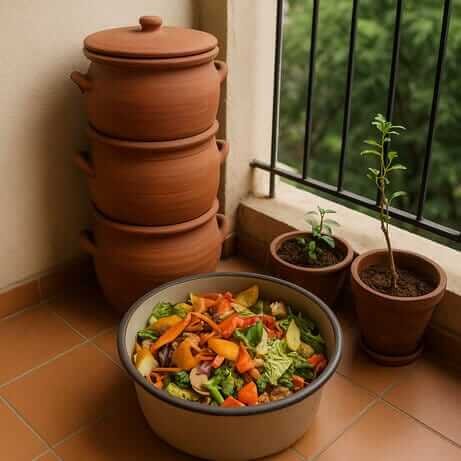
Composting: Converting Food Waste to Garden Gold
For many households adopting the Zero Waste Lifestyle in India, composting becomes the most impactful step toward reducing everyday waste:
Apartment-friendly options:
- Khamba composters – Traditional terracotta pot systems perfect for Indian conditions
- Bokashi systems – Fermentation-based method suitable for small spaces
- Community composting – Many housing societies now offer shared composting facilities
Benefits beyond waste reduction:
- Creates nutrient-rich soil for plants
- Reduces methane emissions from landfills
- Connects urban dwellers with natural cycles
- Can support kitchen gardens even in small spaces
“Composting has made our household much more mindful about waste,” shares Priya Sharma, a zero-waste practitioner from Pune. “And as a bonus, our balcony plants have never looked healthier.”
Quick Tip for Indian Apartments:
If you’re worried about pests or odors, start with a Bokashi system. It’s compact, fast, and works well even in humid cities like Mumbai, Chennai, or Kolkata.
Tools such as terracotta khamba pots and products sold by vendors like Daily Dump are widely used in Indian cities.
Disclosure: Some links or store mentions may be affiliate partners. We may earn a small commission at no extra cost to you. We only recommend products we personally use or have verified.
Reimagining Food Storage
Replace disposable storage options with sustainable alternatives:
- Steel containers instead of plastic wrap or aluminum foil
- Beeswax wraps as a reusable alternative to cling film
- Glass jars for refrigerated leftovers
- Traditional options like banana leaves for short-term food storage
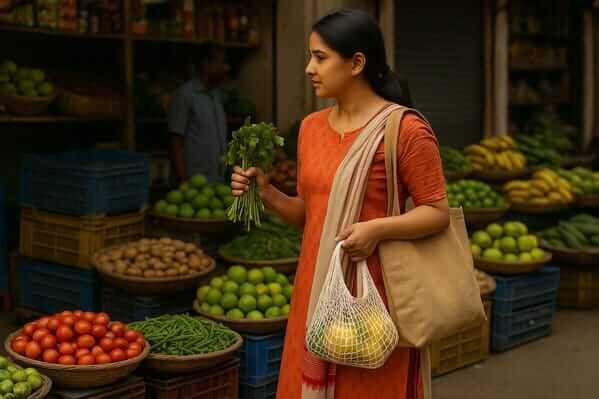
For detailed room-by-room checklists, see our Zero Waste Home Ideas guide.
Zero-Waste Living Beyond the Kitchen: Homewide Sustainable Swaps
Bathroom and Personal Care
The Indian bathroom can be transformed with simple swaps:
- Bamboo toothbrushes instead of plastic ones
- Neem combs replacing plastic versions
- Steel razors rather than disposable plastic razors
- Use menstrual cups or cloth pads instead of disposable sanitary products
- Bar soaps without packaging, instead of liquid soaps in plastic bottles
- Traditional cleansers like besan (gram flour), multani mitti (Fuller’s earth), and shikakai for hair care
Room-by-Room Zero Waste Checklist for Indian Homes
Kitchen: Steel containers, bulk staples, compost bin
Bathroom: Bamboo toothbrush, bar soap, menstrual cup
Wardrobe: Clothing swaps, repair kits, natural fabrics
Bedroom: Avoid synthetics, natural incense, declutter
Kids’ Room: Toy libraries, second-hand books, art from scrap
Entryway: Shoe rack from reclaimed wood, key holder reuse

Cleaning and Household Maintenance
Rediscover traditional cleaning methods that create less waste:
- Vinegar and baking soda for all-purpose cleaning
- Lemon and salt for tackling tough stains
- Use coconut coir scrubbers instead of plastic sponges
- Concentrated cleaners that can be diluted at home
- Repurposed old clothes as cleaning rags
Clothing and Textiles
The fashion industry is a major contributor to environmental problems. Consider these approaches:
- Invest in quality garments that last longer
- Learn basic mending skills to extend clothing’s life
- Support local artisans using natural dyes and fabrics
- Explore clothing rental for occasional wear items
- Organize clothing swaps with friends and family
- Consider second-hand shopping, which is increasingly popular in urban India
Zero Waste on a Budget: Affordable Approaches
One misconception about zero-waste living is that it’s expensive. In reality, many zero-waste practices save money over time:
Cost-Effective Zero-Waste Swaps
- Repurposed glass jars instead of buying new containers
- Cloth napkins cut from old garments rather than paper towels
- Homemade cleaners using simple ingredients like vinegar and citrus peels
- Kitchen scraps replanted to grow new vegetables (green onions, herbs, etc.)
- DIY personal care products using common kitchen ingredients
The Economics of Zero Waste
While some reusable products require upfront investment, they typically pay for themselves quickly:
- A steel water bottle may cost ₹500-800, but it replaces countless plastic bottles
- Cloth bags cost ₹50-100 but last for years, saving on plastic bag fees
- Menstrual cups (₹600-1200) replace years’ worth of disposable products
- Home composting reduces garbage collection fees in some municipalities
As Ahmedabad-based zero-waste blogger Nirja Shah explains, “Initially, people balk at spending ₹800 on a steel bottle when plastic is so cheap. But when I show them the math—that they’re spending at least ₹20 per disposable bottle, multiple times a week—they see how quickly the reusable option pays for itself.”
Community Engagement and Collective Action
Finding Your Tribe
India-focused waste reduction practices are easier with support. Connect with like-minded individuals through:
- Facebook groups like “Zero Waste India” and “Sustainable Living India”
- Instagram communities centered around hashtags like #ZeroWasteIndia
- Local workshops and meetups in major cities
- Neighborhood initiatives for composting or clean-up drives
Influencing Your Wider Community
Individual actions create ripples of change:
- Share successful zero-waste strategies with friends and family
- Request minimal packaging when ordering from local businesses
- Collaborate with neighbors on community composting projects
- Advocate for waste segregation in your apartment complex or neighborhood
- Support schools implementing zero waste initiatives
Many Indian NGOs like SWaCH Pune and Chintan Environmental Research and Action Group are actively helping citizens build zero-waste communities through workshops, door-to-door collection, and advocacy. Explore SWaCH’s community initiatives or Chintan’s citizen toolkit.
Real Stories of Zero-Waste Champions in India
1. Pune Family Cuts 90% of Waste in 1 Year
The Kulkarni family in Pune transitioned to a zero-waste lifestyle by starting with composting and homemade cleaners. Within a year, they had reduced their waste to less than one small bin of trash a month and now inspire their community through weekend workshops.
“It began with cloth bags and steel dabbas. Now, even our neighbours ask for tips!” — Anjali Kulkarni
2. Zero-Waste Campus in Bengaluru
Students of Christ University launched a campus-wide zero-waste campaign in early 2024. They introduced composting pits, phased out disposables, and organized awareness drives. In internal tracking shared during the initiative, the campus reported waste reductions of more than half within eight months.
“Once we saw the numbers drop, we knew it was working — and contagious!” — Rahul Mehta, Student Council Lead
Many Indian universities are taking the lead in environmental reform. For instance, IIT Delhi and TERI School of Advanced Studies have published research and implemented sustainability programs. Learn more about TERI’s zero-waste efforts.
3. Local Dabbawala Goes Eco in Mumbai
Ravi, a Mumbai-based tiffin service provider, switched to stainless steel containers, refusing single-use plastic entirely. His customer base grew significantly after he began promoting his ‘zero-waste meals’ on Instagram.
“Customers value sustainability — it’s not just about the food anymore.” — Ravi Patil
4. Kolkata Apartment Society Turns Zero-Waste
Residents of Gariahat’s Nirmalya Apartments now segregate waste, compost food scraps, and run a swap shop in the building lobby. With support from an NGO, they have diverted several tonnes of waste from landfills in 2024 alone.
“Our building feels cleaner, greener, and more united.” — Society Secretary
Navigating Special Occasions and Celebrations
Festivals and celebrations can generate significant waste, but also offer opportunities for creative, sustainable solutions:
Eco-Friendly Festivals
- Celebrate Diwali with clay diyas instead of plastic decorations
- Use natural colors made from flowers and spices for Holi
- Choose plantable Ganesh idols for Ganesh Chaturthi
- Gift experiences or homemade treats instead of heavily packaged items
- Decorate with reusable cloth bunting or flower garlands rather than balloons

Sustainable Weddings and Events
The big fat Indian wedding is becoming greener with trends like:
- Digital invitations replacing paper cards
- Rented decor instead of disposable setups
- Leftover food donation programs
- Reusable cutlery and serveware
- Ethical gifting options
Measuring Progress and Staying Motivated
Tracking Your Waste Reduction
Document your journey to stay motivated:
- Keep a waste journal, noting what you discard
- Take “before and after” photos of your trash output
- Calculate the money saved through reusable alternatives
- Note environmental benefits like reduced plastic consumption
Handling Setbacks
The zero waste path isn’t always perfect:
- Focus on progress, not perfection
- Remember that small, consistent changes add up
- Celebrate victories, however small
- Share challenges with your community for support and solutions
The Future of Zero Waste in India
The zero waste movement in India continues to evolve, with exciting developments on the horizon:
Policy Changes
- Several states—including Maharashtra and Tamil Nadu—have introduced bans or restrictions on single-use plastics (State Government notifications, 2023–2024).
- Extended Producer Responsibility (EPR) regulations hold companies accountable
- Municipal incentives for waste segregation and reduction
- Government support for composting initiatives
The Toxics Link NGO tracks waste regulations in India and supports the implementation of Extended Producer Responsibility (EPR) frameworks to hold companies accountable.
(Source: Ministry of Environment, Forest & Climate Change — Plastic Waste Management Rules 2016 & 2022 Amendments; CPCB State-Level Plastic Ban Notifications.)
Innovations to Watch
- Biodegradable alternatives to plastic made from agricultural waste
- Packaging-free retail expanding beyond major metros
- Waste-to-resource technologies developed specifically for Indian conditions
- Circular economy business models are gaining traction
Conclusion:
Starting your Zero Waste Lifestyle in India doesn’t require big changes—small, consistent habits can transform your home’s waste footprint.
Adopting low-waste habits in India is less about perfection and more about small, consistent decisions—like segregating waste and refusing single-use plastics. Here traditional wisdom often aligns with sustainable practices, embracing zero waste can feel like both innovation and homecoming.
Start with small, manageable changes that work for your household. Focus first on high-impact areas like kitchen waste and single-use plastics. Allow your practices to evolve gradually, finding solutions that work within your budget, space constraints, and lifestyle.
Remember that every refused plastic bag, every composted food scrap, and every repaired item instead of a new purchase contributes to a larger movement—one that honors India’s sustainable heritage while building a cleaner future for coming generations.
Download Your Free Zero-Waste Checklist (PDF) – a simple one-page guide with daily waste-reduction prompts tailored for Indian households. No payment required.
Frequently Asked Questions (FAQs)
What is the zero waste lifestyle in India?
The zero-waste lifestyle in India focuses on reducing the amount of waste sent to landfills by reusing, repairing, composting, and recycling. It draws from India’s traditional practices like using cloth bags, steel containers, and homemade cleaners to create a sustainable, low-waste life.
Is zero-waste living expensive?
Not at all. While some items like steel bottles or menstrual cups require an initial investment, they save money over time. Many zero-waste practices—like composting kitchen scraps, reusing containers, or making DIY cleaners—are more affordable than conventional options.
How can I start a zero-waste lifestyle at home in India?
Start small by doing a waste audit, segregating your waste into wet, dry, and reject categories, and replacing single-use items with reusable ones. Focus first on your kitchen and bathroom for impactful changes. Composting and carrying your bags are great first steps.
What are some common zero-waste swaps in Indian homes?
Popular swaps include:
- Use cloth bags instead of plastic
- Bamboo toothbrushes instead of plastic ones
- Steel containers for food storage
- Menstrual cups instead of sanitary pads
- Bar soaps over bottled soaps
- DIY cleaners from vinegar, baking soda, and lemon
Can I compost food waste in an apartment?
Yes! Options like khamba pots, Bokashi bins, and community composting setups are perfect for apartments. These systems are compact, odor-free, and easy to maintain—perfect for Indian urban settings.
How can I reduce plastic waste when shopping in India?
Carry your cloth or jute bag, shop from local vendors who allow BYO containers, and choose unpackaged produce or bulk-buy essentials. Many Indian cities also have zero-waste stores where you can refill groceries and cleaning products.
FREE DOWNLOAD: Zero-Waste India Starter Checklist
Ready to simplify your life and reduce your environmental impact? Get our free, beginner-friendly checklist tailored to Indian homes and lifestyles.
Download Now (PDF | Printable)
About the Author
I’m Soumen Chakraborty, the founder and lead researcher at GreenGlobe25. I specialize in translating complex data on pollution, climate risks, and sustainability into clear, actionable guides for Indian households and communities.
My work is based on a rigorous analysis of authoritative sources like the CPCB and WHO, following our publicly-available Fact-Checking Policy to ensure every piece of content is accurate and trustworthy.
LinkedIn: chakrabortty-soumen
Facebook: Ecoplanet
Last update on December 2025.
Ready to Start Your Zero-Waste Lifestyle in India?
Join the 7-Day Zero-Waste Challenge – includes a printable checklist with practical daily tasks designed for Indian homes. – [Download the Printable Checklist]
- Day 1: Refuse a plastic bag
- Day 2: Carry a reusable steel bottle
- Day 3: Segregate your kitchen waste
(…and more – follow along for the full 7 days!)
Share your progress in the comments or tag us on Instagram @greenglobe25!
This website provides educational content related to environmental practices and sustainable living. It does not offer medical, legal, or professional advice. Some pages may contain affiliate links, but these never influence our editorial decisions.
Disclosure: Some links or store mentions may be affiliate partners. We may earn a small commission at no extra cost to you. We only recommend products we personally use or have verified.
References
- Plastic Waste Management Rules (2016, amended 2022).
- Central Pollution Control Board (CPCB).
- State Plastic Ban Notifications (2023–2024).
- Ministry of Environment (MoEFCC)
- Groundwater Pollution in India (2025): Nitrate, Fluoride & Arsenic Contamination Explained - December 1, 2025
- How Air Purifiers Work: Real Science, Real Effectiveness & India-Focused 2025 Guide - November 20, 2025
- Indoor Air Pollution in India (2025 Guide): Hidden Sources & Health Risks - November 16, 2025
